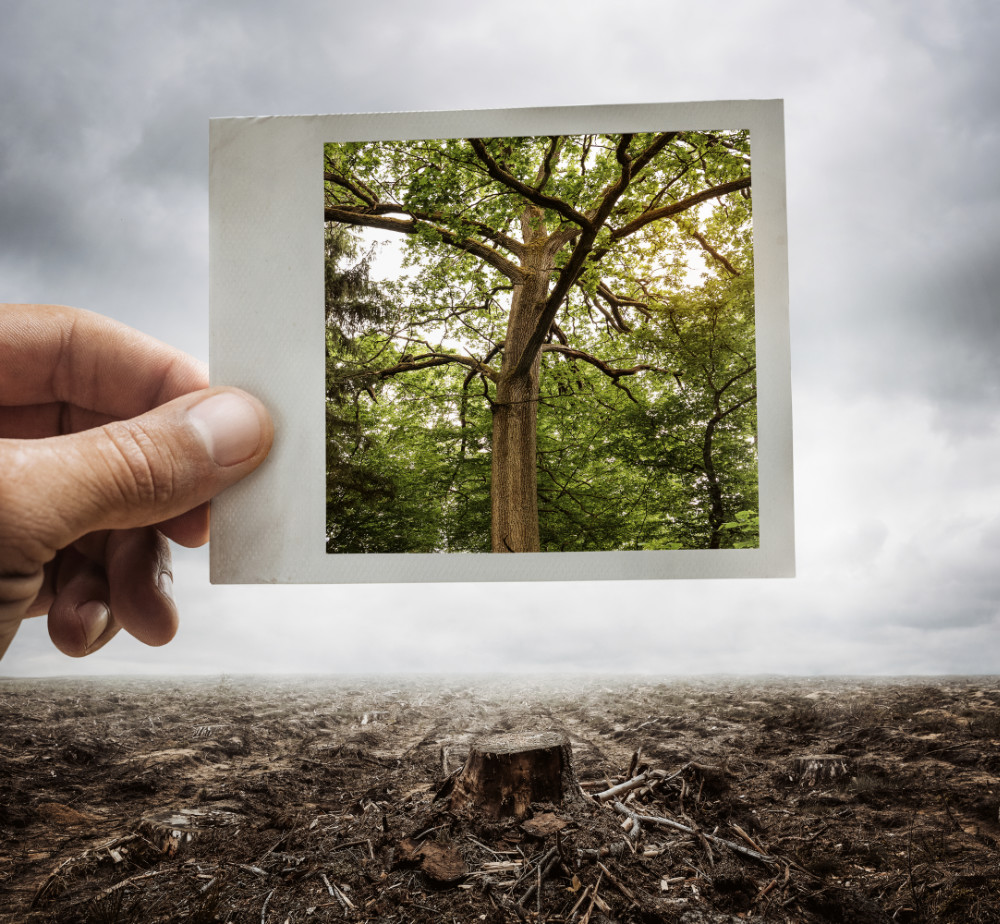Would You Let Your Home Decay Around You?

As rational animals we believe we wouldn’t live in a home obviously decaying around us and not do something about it if we could. But this is exactly what we have done, and continue to do, with the only real home we have. The interesting question is why we can compartmentalise what we do so easily.
As an example of this compartmentalisation let’s look at Australians who are a little bit home renovation crazy at the best of times, and went even more mad during the global pandemic, when international travel was off the table. Too few have made the link that their new home was created on the back of tainted timber. They haven’t made the links that the daily discussion about supply chain delays for timber products probably means a beautiful hard wood forest is being raised to the ground in a developing nation.
So, back to the question, why are we willing to destroy the only home we have? And how do we find it so easy to ignore what we are doing to nature and wildlife?
If we assume that humans are simply animals, then this may explain what is happening. We are simply taking advantage of our superior adaptability and are fully exploiting our ‘ecological niche’. But most humans would dispute that we are simply animals and would claim that our capacity for self-reflection and ‘rational thought’ would enable us to behave differently. Which evidently hasn’t happened yet, so we need to ask the question, “Why not?”.
This means examining the guiding ideology, the basic and implicit assumptions that we take for granted and NEVER question, so becoming unconsciously embedded in social norms and, as a result, self-reinforcing. It also matters that we do not choose these theologies, we are born into them. They are all-pervasive, deeply rooted in all aspects of culture, including media, education, business – everything.
This becomes self-evident when we look at what content Western media of any type is willing to champion and what gets ignored. Everything in the Western mainstream media (books, music, TV, print, radio, film/streaming, online platforms, theatre etc.) is today geared towards consumption and not only because of advertising or product placement. The major story lines involve characters who can and will consume. It does not matter whether they are advocating more traditional ‘stuff’ or ‘alternative choices’ like wellness or prepping. The lifestyle espoused is always about buying, acquiring, consuming. Anyone without the means to consume is either ignored or vilified.
Prioritising our own gratification over nature is embedded in our guiding ideology and has been for a long time. A recent book, Theology and Climate Change, by Paul Tyson, examines the question of our current guiding ideology and its origins in great detail. His central argument is that a particular type of Western and Christian theology that he calls Progressive Dominion Theology (PDT) profoundly shapes the modern and Western outlook on nature.
When applied to the natural world, in our modern understanding, nature has no inherent meaning and hence no inherent value. It is not divine, as it was in most earlier theologies. That, in turn means that is perfectly OK for us, as humans, to make nature fit ‘our’ purpose. In fact, it puts no constraints at all on what we do with nature. We have separated morality from nature and now we find there are no moral reasons why destroying nature is actually wrong.

This presumption of sovereignty, of rulership, over nature is now so deeply embedded in our assumptions of ‘being human’ that we no longer notice its origins and we have only just begun to question its usefulness to our continued existence.
That there are limits to growth (was and) is still a fringe belief today. Physics is useful for enabling ‘progress’ but cannot be seen to spoil the economic growth party. So, economists are taught to believe in limitless growth, unlimited extraction and substitution of natural resources (ignoring the energy cost of doing so) and see no problem with ignoring the effects of dumping waste into the environment (CO2, methane, chemicals, plastics, contaminated waste water etc.).
When physics predicts calamity due to global warming, those warnings are first ignored, then downplayed, then actively attacked and finally ‘taken seriously’ by entering dubious pledges and meaningless commitments, which is the stage we are currently in.
The same is playing out in relation to biodiversity. The science that tells us that we have set off the sixth mass extinction event is not the science anyone in power wants to listen to. Destructive consumption is baked into our ideology about progress.
Arguments between capitalist and socialists are about the distribution of the spoils, not about the value or morality of doing the spoiling. Progressives and conservatives may argue over greater equality or moral values embedded in culture, but they don’t argue over the question of our power over nature. Both progressives and conservatives believe that our ecological problems will be solved by technology, not by fundamentally changing our relationship to nature.
Even the recent trend in conservation of ‘pricing ecosystem services’ is equally an expression of this underlying theology. If nature has no inherent value that makes it worth protecting, then the only way we can think of making it valuable is by putting a price on it. This shows a dearth of imagination that we ought to feel ashamed of, but instead this approach is being universally embraced as the ‘best way forward’.
So, how do we become conscious of this progressive dominion theology way of thinking, so we can start to change it?

Let’s go back to property renovation and ask a simple question, “Would you only renovate your property if in doing so you would be able to get gift tax deductibility on your renovation, for everything you spend over $2?”. No, this would be ridiculous right? You wouldn’t let your home decay around you simply because gift tax status doesn’t apply to home renovation projects, would you?
Here’s the thing, you already have.
Are you ready to challenge this way of thinking and behaving?
Our work is entirely reader-supported, so if you enjoyed this article please consider sharing it around, following us on Twitter or LinkedIn, or throwing some money into our tip jar on Paypal. Everything we publish is open access. Finding the time to do the research and writing is helped by the goodwill of people who are also looking for real answers to what is happening. The best way to make sure you don’t miss the articles we publish is to subscribe to the mailing list at our website.

Lynn Johnson is a physicist by education and has worked as an executive coach and a strategy consultant for over 20 years. In her work she pushes for systemic change, not piecemeal solutions, this includes campaigning for modernising the legal trade in endangered species, to help tackle the illegal wildlife trade.





